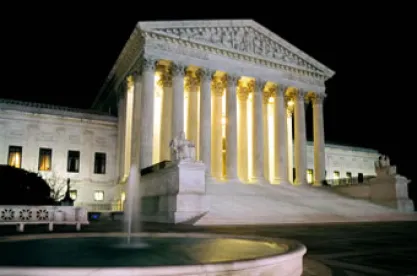In the first Sarbanes-Oxley Act case reviewed by the United States Supreme Court since the law was enacted in 2002, Lawson v. FMR, LLC, No. 12-3, the Court is set to decide whether SOX affords protection only to employees of public companies or whether its protection extends to employees of private companies providing services or goods to public companies as contractors or subcontractors. The Court’s decision could extend SOX’s protection dramatically to employees of many private U.S. companies, exposing businesses to the risk of SOX claims they never anticipated.
Section 806 Whistleblower Protection
The SOX whistleblower provision, Section 806, creates a private cause of action for individuals who suffer retaliation after reporting potential securities fraud at a public company to their supervisor or to the government. It states that no company covered by SOX or “any officer, employee, contractor, subcontractor, or agent of such company, may discharge, demote, suspend, threaten, harass, or in any other manner discriminate against an employee in the terms and conditions of employment” for engaging in protected whistleblowing activity. 18 U.S.C. § 1514A(a) (2013) (emphasis added).
First Circuit Decision
The United States Court of Appeals for the First Circuit in Boston construed Section 806 narrowly to cover only employees of public companies. Lawson v. FMR, LLC, 670 F.3d 61 (1st Cir. Feb. 3, 2012). The plaintiffs were former employees of private investment advisory firms that provided services to mutual fund companies defined as public companies under SOX. They alleged their employers terminated them because they raised specific concerns of illegal activity relating to their employers’ services for the mutual fund companies. The mutual fund companies have no employees themselves. The trial court refused to dismiss the plaintiffs’ claims, reasoning that SOX’s whistleblower provision also covers employees of private contractors when those employees engage in whistleblowing activity “relating to fraud against shareholders” of the public company.
The First Circuit reversed following a detailed analysis of the language and legislative history of Section 806. It concluded that the statute applied only to employees of public companies. It held the phrase, “any officer, employee, contractor, subcontractor, or agent of such company,” describes only which actors are prohibited from retaliating against an employee of a public company. The plaintiff’s contrary argument, which had been accepted by the trial court, was that this phrase describes employees, in addition to employees of public companies, entitled to SOX whistleblower protection.
The Court of Appeals ruled that: (1) “contractors” and “subcontractors” are prohibited from acting as “hired guns” to retaliate against employees of publicly traded companies; and (2) SOX does not apply to alleged retaliation by “contractors” and “subcontractors” against their own employees. This decision contradicts the Department of Labor’s interpretation of SOX. The DOL’s Administrative Review Board held in Spinner v. David Landau & Associates, LLC, ARB Nos. 10-111, 10-115 (May 31, 2012), that SOX covers employees of private contractors and subcontractors of public companies. The First Circuit in Lawson did not give any deference to DOL’s interpretation.
Briefs and November 12 Argument
In legal briefs to the Supreme Court, the plaintiffs argued that SOX must be read to cover employees of private contractors to public companies. They maintained that that interpretation is essential to achieving the purposes of SOX, arguing that SOX “was adopted in the wake of the collapse of Enron,” whose “public statements of its financial position were an elaborate hoax,” and Congress was particularly troubled by the fact that Enron outsiders, including accountants and lawyers, either assisted in or did nothing to prevent the misconduct. Therefore, the whistleblower provision was enacted for the protection of such outsiders, they argued. This position is supported by amici briefs from groups that advocate expansive employee rights, including the National Employment Lawyers Association (NELA), as well as the brief submitted by the United States.
During oral argument on November 12, 2013, the Supreme Court justices were concerned about the implications of expanding SOX to cover all private company employees. They struggled with possible limitations on such an expansion. Justice Stephen G. Breyer, hypothesizing about a gardener who worked for a public company, asked, “Does [SOX] want to make every mom and pop shop in the country, when they have one employee, suddenly subject to the whistleblower protection for any fraud, even those frauds that have nothing to do with any publicly traded company?” Justice Antonin Alito took Justice Breyer’s hypothetical one step further, asking the plaintiffs’ counsel why Congress would want to protect the gardener who performed work for a customer who happened to be a public company, but not the one who performed work for a private company. The justices gave short shrift to the plaintiffs’ alternative argument for the Court’s simply deferring to the DOL’s decision in Spinner.
Implications of Broad Interpretation
The Court’s decision may turn on legal principles of statutory construction and the deference owed to executive agencies (in this case, the DOL). Should the Court hold SOX protects whistleblowing employees of a private company from retaliation when they report fraud or other wrongdoing by a public company customer, one question that would arise is this: what obligation, if any, does their employer have to address those reports, where they do not directly relate to the employers’ own business?
In addition, both Lawson and the DOL’s Spinner case involve employees in the financial services industry, who may be expected to possess knowledge related to the securities filings of their employer’s public company customers. If the Supreme Court interprets SOX’s whistleblower provision to apply to private contractors of public companies, plaintiffs’ counsel likely will argue that application should not be limited to the financial services industry. In this setting, employees of privately held companies that provide services to public companies entirely unrelated to shareholder disclosures, such as caterers, construction companies and drug testing vendors, may assert whistleblower protection for reporting allegations or suspicions about any alleged fraud by public companies. It would then take but a short step to argue for SOX as a near-universal federal whistleblower cause of action, no longer tethered to securities law issues of public companies.
While we await the Supreme Court decision, both publicly held and privately held companies should continue to maintain a strong internal reporting mechanism with multiple avenues for employees to report legitimate concerns. They should respond seriously to whistleblower reports by engaging in appropriate investigations. An employer can better defend its legitimate employment decisions, whether under SOX or otherwise, when decisions are supported by clearly articulated, well-documented reasons unrelated to any potentially protected activity.







 />i
/>i
